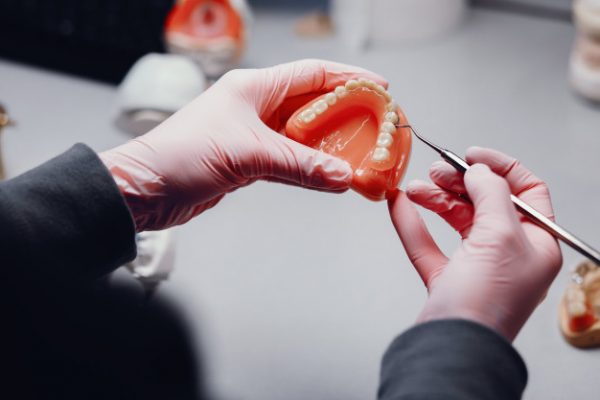Choosing the right material for your denture teeth is important, as it affects their wearability and comfort. Your denturist will be able to guide you through all your options but to give you an idea of which might be right for you.
Dentures are made of many different materials including composite resin, porcelain, acrylic resin, and acrylic. However, acrylic and porcelain are the two most common and are used extensively by denturists for making custom denture teeth.

Comparison between Porcelain and Acrylic
Durability
Porcelain is a much harder substance than acrylic, which results in better long-term durability over acrylic. Porcelain is better able to withstand the daily wear and tear on teeth, and helps to preserve the jaw movements when used in false teeth.
Acrylic, on the other hand, faces faster abrasion and wears down more quickly over time. But it is also less prone to cracking and breakage than porcelain, meaning that while they may not hold up as well over the long term, they’re less susceptible to accidental breakage in the short term.
Bonding
Regardless of the tooth material, the base of dentures is most frequently made of acrylic. This allows acrylic teeth to be bonded chemically to the base while porcelain teeth, on the other hand, cannot be chemically bonded to an acrylic denture base. This creates a potential limitation and can affect the strength of the individual teeth affixed to the base.
Bone Loss
Porcelain teeth tend to put more pressure on the gums and jaw bone, so they are not ideal for those who are experiencing bone loss. For denture patients with bone loss, acrylic is generally agreed upon as the way to go.
Oral Hygiene
Porcelain dentures are easier to clean because they have a hard surface where bacteria cannot easily thrive. Therefore, it is possible to maintain better oral hygiene with less effort.
Acrylic dentures have microscopic indentations, which are a great place for bacteria to hide and grow. If these dentures are not cared for properly every day, the bacteria can multiply very quickly, leading to bad breath and other health complications.
Porcelain, however, is easier to break when cleaning; damaging these dentures while cleaning them is quite common.

Staining
Neither of these materials stain easily; one does not offer an advantage in this area over the other.
Price
Price is always a major factor when getting dentures, but the good news is that the difference between the two types of dentures isn’t very significant. For this reason, you can choose the best material as recommended by your denturist without worrying about the price.
Conclusion
There is really no material that is considered the best one. Each has its own perks, so the decision is up to you.
Source: European Denture Center


 Vi
Vi